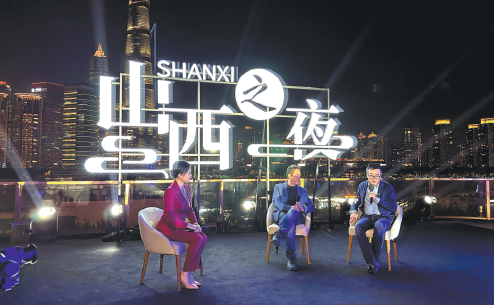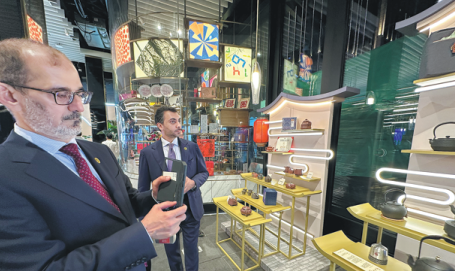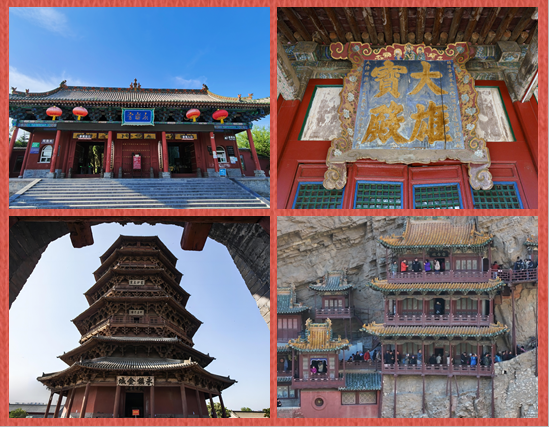Shanxi showcases industry and culture at CIIE
Updated: 2023-11-10

A host introduces Shanxi's business opportunities at the Shanxi Night gala held in Shanghai on Sunday. [Photo by Li Zhaomin for China Daily]
Province highlights investment promotion and heritage crafts at expo in Shanghai
The North China province of Shanxi is showcasing its opportunities in trade and investment, achievements in economic growth and industrial transformation, and abundant resources in culture and tourism at the sixth China International Import Expo.
The sixth CIIE is being held in Shanghai from Sunday to Friday, attracting the participation of more than 3,400 exhibitors and nearly 410,000 professional visitors from 154 countries, regions and international organizations.
The Shanxi pavilion, covering an area of 576 square meters, consists of nine zones for investment promotions; industry chains; characteristic towns; exports; famous local brands; rural tourism; cultural tourism; specialty food and livestreaming promotions.
Located near the east entrance of the National Exhibition and Convention Center (Shanghai), the main venue of the expo, the Shanxi pavilion is one of the most eye-catching pavilions as it resembles the Shanxi Museum, which is one of the nation's most famous museums for its collection of exhibits and novel exterior appearance. The shape of the main building resembles an ancient Chinese cauldron.
The design of the pavilion is both classical and modern, which features major cultural and tourism resources of Shanxi displayed on a huge screen and light-rendered silhouettes of local landmark attractions, such as the Taihang Mountains, on the ceiling and walls of the pavilion.
As one of China's leading provinces in terms of cultural heritage, Shanxi is enticing visitors with its dazzling exhibitions of folk artworks like cloth craft from Ruicheng, hand-polished lacquerware from Pingyao, twin-color porcelain from Changzhi and iron kettles from Jincheng.
This is the first time that Changzhi-based company Bayi Kiln Twin-Color Porcelain Culture has attended the CIIE. Its debut show of red-and-green porcelain goods has won much interest from visitors.
According to Li Jianping, a senior executive of the company, Bayi is an ancient kiln that has been operational for about 1,000 years.
"In the Song Dynasty (960-1279), it was one of the country's pioneers in firing porcelain items featuring the twin colors of red and green," Li said. "Such items of that period were often referred to by collectors as the 'earliest rainbow porcelain of China'."
In 2021, the ancient porcelain-making technique of Bayi Kiln, which has been well preserved to date, was included in the list of national intangible cultural heritage items.
Li said his company, named after Bayi Kiln, is also the inheritor of centuries-old techniques for making the twin-color porcelain.
"The process for turning a piece of kaolin clay into an exquisite piece of porcelain requires 72 procedures," Li said. "We are here at the CIIE to make our cultural heritage known to the world and boost its development through expanding into the broader global market."
Also promoting Shanxi's cultural heritage at the CIIE is the Shanxi Alliance for Arts and Crafts. It is exhibiting 40-plus artworks created by master craftsmen and cultural heritage inheritors in Shanxi.
An official of the alliance said that Shanxi is home to 182 items on the national list of intangible cultural heritage, placing it in the top rank nationwide.
"Shanxi was one of the cradles of Chinese civilization and it is still at the forefront of the nation's cultural creativity industry," the official said. "We are here to display the essence of Shanxi culture, trying to tell visitors from across the world the stories of the past and present of Shanxi, as well as the nation, through displaying the cultural assets created by our ancestors and contemporaries."
Muhannad Alnaqbi, the consul-general of the United Arab Emirates in Shanghai, visited the exhibition of Shanxi's cultural heritage, praising it as a great way to help to showcase the province's history and culture.

Overseas businesspeople visit a handicrafts booth at the Shanxi pavilion. [Photo by Li Zhaomin for China Daily]
The promotion of Shanxi is not limited to the CIIE venue. On Sunday, a Shanxi Night gala, which was jointly hosted by the Shanxi provincial government and other provincial governmental institutions for commerce, investment and cultural tourism, opened at the Shanghai Fosun Art Center.
The event, consisting of performances featuring local arts and cultural heritage and a buffet reception, functioned as an opportunity for displaying Shanxi's unique resources and for networking between businesses in and outside Shanxi.
During the gala, Shanxi's officials presented special gifts to the guests – creative cultural items crafted by Shanxi's craftsmen and a brochure introducing Shanxi's business opportunities in 10 advantageous industries, as well as its unique cultural and tourism resources.
Guests at the gala were informed that Shanxi is promoting an economic transformation that highlights the upgrading of its traditional sectors including coal mining and other heavy industries and the cultivation of strategic emerging industries. These include special steel; new energy vehicles; advanced manufacturing; solar and wind power; hydrogen; modern pharmaceutics and semiconductors.
The province is also accelerating the development of characteristic towns for specialty industries. And these sectors will be fields with great potential for investment and business cooperation.
In addition to the gala, Shanxi's governmental institutions and enterprises held a number of networking events on the sidelines of the CIIE to assist business and cultural exchanges.
For instance, a promotional fair for industrial cooperation in Shanxi was held on Monday. Investment promotion institutions from Shanxi's various cities, industrial parks and development zones introduced their business environments, preferential policies and industrial potential during the event.
Xinghuacun Fenjiu Group, a renowned white liquor producer in Shanxi, hosted a forum on the development of the white liquor industry on that day, inviting experts to share their insights on the industry and culture related to the sector.
Yan Jie and Ren Zhixia contributed to this story.



